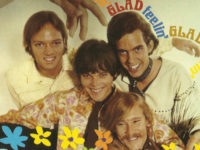There’s no denying Barry Mann and Cynthia Weil’s place as one of best songwriter teams in the rock and roll era. They’ve written so many hits for so many artists through the years.
To name just a few: The Drifters (“On Broadway,” 1962), George Benson (“On Broadway,” 1977), the Animals (“We Gotta Get Out of This Place”), Dolly Parton (“Here You Come Again”), the Crystals (“He’s Sure the Boy I Love”), Paul Revere and the Raiders (“Hungry,” “Kicks”), Gene Pitney (“I’m Gonna Be Strong”), Mama Cass Elliot (“Make Your Own Kind of Music”), the Monkees (“Shades of Gray”), Max Frost and the Troopers (“Shape of Things to Come”), the Ronettes (“Walking In the Rain,” 1963), B.J. Thomas (“Rock n’ Roll Lullaby,” “I Just Can’t Help Believing”), Linda Ronstadt and James Ingram (“Somewhere Out There”), Hanson (“I Will Come to You”), Jay and the Americans (“Only in America,” “Walking In the Rain,” 1969), and two of the Righteous Brothers’ biggest hits (“[You’re My] Soul and Inspiration,” “You’ve Lost That Lovin’ Feelin'”), too.
The 28-song On Broadway: The Songs of Barry Mann and Cynthia Weil, however, provides a wide selection of their more obscure songs as recorded by other artists from U.S., U.K. and Australia over the years – and, in some cases, not the big hits as associated by the original artists. For instance, we hear “You’ve Lost That Lovin’ Feelin'” as ably done by Dionne Warwick in 1969, “On Broadway” by the Crystals (1962), “Hungry” by the 5 A.M. Event (1966), “Shapes of Things to Come” by the Graduates (1968), and “We Gotta Get Out of This Place” by Chuck Day and the Young Gyants (1968).
Would any of the non-hit singles and/or covers provided here have been hits? I seriously doubt it. Not because they’re bad versions, or because the lesser-known tunes are bad, either. It’s just that they don’t have the magic ingredient that the original hits had. It really comes down to the song itself, the artist or band’s performance, the producers and/or record company, and in the timing – of being at the right place at the right time with the right song.
The Delphonics’ “When You Get Right Down To It” is a fine R&B song and performance, and it did actually chart (U.S. Pop No. 53 /U.S. R&B No. 12), but this song lacks the special ingredients of their crossover Top 10 hit “(Didn’t I) Blow Your Mind This Time.” Jackie Wilson’s “Nobody But You” is another example found on On Broadway: The Songs of Barry Mann and Cynthia Weil; it’s a fine, soulful performance but it did not chart.
The Executives did find success with 1968’s “It’s a Happening World,” found on On Broadway: The Songs of Barry Mann and Cynthia Weil; they reached No. 24 on the pop charts in their native Australia. Singer Terry Knight, prior to changing careers and later becoming Grand Funk Railroad’s manager, released “Come Home Baby” (1967) in the Tom Jones mold for the Cameo label. Barry Mann himself submits the upbeat and feeling good, Brill Building-influenced “Talk to Me Baby” from 1964.
There are a couple of ballads that went unreleased at the time, including Skeeter Davis’ “I Don’t Want to Love You” (1964) and B.J. Thomas’ “This Is a Love Song” (1969/70). A couple of Wall of Sound, Righteous Brothers-influenced wannabes show up in the Paris Sisters’ “See That Boy” (1967), Normie Rowe’s “It’s Not Easy” (1966) and Walter Jackson’s “Not You” (1967). Folkie Glenn Yarbrough tries for another up-tempo pop hit, but doesn’t quite get there on “It’s Gonna Be Fine.”
The generous and informative 31-page booklet for On Broadway: The Songs of Barry Mann and Cynthia Weil provides the full story for each track, along with thoughtful pictures of some of the artists. But none of the faithful, polite (cover) versions and obscure tunes here are going to make you forget about the original artist’s hit single versions.
Instead, On Broadway: The Songs of Barry Mann and Cynthia Weil offers mostly curiosities for admirers and collectors of this brilliant songwriting duo’s ’60s and ’70s songbook.
- How the Bee Gees Overcame It All to Produce the Magical ‘Odessa’ - March 29, 2024
- How an ‘Antique French Garage Band’ Nailed the Whole Soul Music Vibe - November 27, 2022
- Kyte – ‘Kyte’ (2009): Forgotten Series - April 9, 2022



